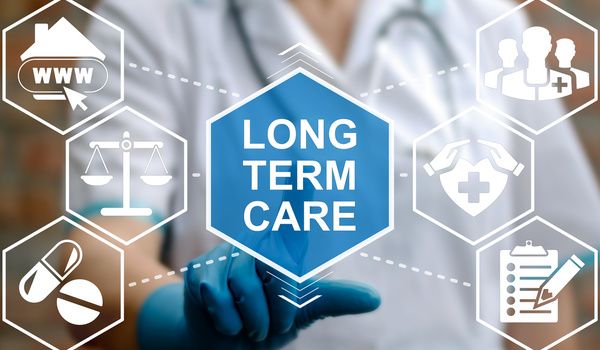Many of us will need some type of highly expensive long-term care in the future. While Medicaid covers long-term care expenses, eligibility is based on strict income and asset limits.
If you are like most Americans, you or someone in your family eventually will require some type of long-term care.
About 70% of people now 65 and older will need ongoing assistance that can range from help with daily activities to long-term medical treatment and supervision, according to government estimates. Nearly 20% of older Americans need long-term care for five years or longer.
It's a very expensive proposition. A private room in a nursing home will exceed $106,000 - or about $9,000 a month, according the Genworth Financial Inc. study. It will cost an estimated $51,000 per year for an assisted living facility, $165 a day for memory care and $22 an hour for home health aides.
A long stay in a nursing home, which averages 30 months, can consume your life savings and an inheritance meant for loved ones. Families coping with Alzheimer's disease sometimes require several years of supervised and skilled care. The expenses are overwhelming for the average retiree's household income of $48,000.
Medicare pays for some limited post-hospitalization rehabilitation, but it doesn't cover long-term care in an assisted living center or nursing home. It's the same case with most private health insurance plans. Meanwhile, traditional long-term care insurance coverage has become unavailable or unaffordable for most people in recent years. Lacking insurance coverage, an estimated 62% of Americans who will need long-term care will run out of money paying for it.
A shared goal of older Americans is to remain at home as they age, avoid placement in a nursing home - and keep from going broke. Family members play an important role in that objective.
Because of the cost of care, family caregivers are the first line of assistance for older adults who need help with the essential activities of daily living that include bathing, eating, dressing, toileting, transferring and continence. In many cases, adult children will provide unpaid care that enables a parent or parents to remain in the home and delay or avoid expensive professional care.
The road to expensive professional long-term care is usually progressive. It tends to begin with moderate needs that can be fulfilled by a healthy spouse, the family support group or with the help of an in-home health aide. When care at home is no longer feasible, the next step may be an assisted living facility in which some supervision and help with daily activities is provided. When acute care becomes necessary, patients transition to the most expensive forms, skilled care in a nursing home or custodial care in a memory care center or similar institution.
When does Medicaid pay for care?
Medicaid is a joint federal and state program that pays for health care for those with low incomes or high medical expenses relative to their income and assets. Medicaid will pay for care in a nursing home if you meet very strict and complicated eligibility requirements.
Administered at the state and even the county level, Medicaid is the payer of last resort. Medicaid's eligibility threshold for income and assets varies from state to state. Generally, the income threshold is near the federal poverty level (about $2,250 per month), and non-exempt assets are limited to about $2,000.

Medicaid won't pay for care until patients “spend down” their own assets to the eligibility limits.
Making uncompensated transfers - such as outright gifts or property sold below market value - within 60 months of applying for Medicaid can result in a penalty period that delays eligibility.
Under Medicaid's look-back and asset transfer penalty rules, financial transactions are reviewed to determine whether assets were given away, transferred into a trust or sold for less than fair market value within the 60-month window.
The penalty period is determined by dividing the amount of the transferred asset by the average monthly cost of nursing care. So, for example, if an individual improperly gives away $80,000 to a family member and the cost of care is $8,000 monthly, the ineligibility period would be 10 months.
“The reason for this penalty period is that these assets could have been used to help cover the cost of long-term care, had they not been gifted or transferred,” according to payingforseniorcare.com.
You can act to protect assets, however, if your uncompensated transfers are made at least 60 months in advance of the eligibility claim.
What assets are exempt from spend down?
We'd prefer to let our loved ones inherit our nest eggs. But you can't suddenly give away your money and property to your adult children or grandkids in order to meet Medicaid's asset limits.
Many people concerned about a nursing home stay or long-term care expenses might be inclined to quickly transfer ownership of the home to a loved one. They wrongly assume a house in another person's name would be immune from claims and wind up violating the look-back rules by transferring property.

A person's home (with a threshold equity value ranging from $525,000 to $802,000 depending on the state) is not considered an available asset and is exempt from spend down. One vehicle as well as personal effects - clothing, furnishings, jewelry and related items - also are exempt. So, giving away your personal belongings is not necessary.
Also, spousal allocation rules also provide important exemptions that preserve assets for married couples. They are intended to prevent impoverishment of the spouse not claiming Medicaid, also known as the community spouse.
The community spouse allocation enables a healthy spouse to retain half of the couple's assets (or a minimum of about $127,000 in some states) and receive a minimum income of $2,900 per month. The spousal allocation is determined based on available resources at the time of application for Medicaid.
For example, if a married couple's combined countable assets were $200,000, the community spouse retains $127,000 with $72,000 considered available to pay for patient care before Medicaid takes over. However, that $72,000 could be spent down by being converted into exempt assets like medical equipment, a home mortgage, a car, a special-needs trust or a prepaid funeral plan.
Yet some people unnecessarily transfer ownership of the homestead, money and other assets to an adult child or into an irrevocable trust because they misunderstand asset and spousal allocation rules that provide for important exemptions.
If you do transfer ownership of your home, you may create uncertainty over your own living situation. Adult children or a trustee, for example, have the power to sell the home even if you object because you no longer have control of the asset.
Can Medicaid take my home?
Many people worry that Medicaid will come after the family home. While the state can place a lien on your house for the value of care provided, it can't force a sale during your lifetime.
Medicaid cannot “take” your home as long as you live there or intend to live there; if it's occupied by a spouse, underage child, disabled child of any age; or if a sibling with an equity interest lives there. Also, states may waive estate recovery if it would cause undue hardship.
But long-term care, like most things in life, is never free. Federal law requires Medicaid to attempt to recover benefits paid for care from the estates of deceased recipients.
Estate recovery is often limited to probate estates, although assets remaining in a trust may be used to reimburse Medicaid under certain conditions.
Can I leverage my assets for long-term care?
It's possible to take the initiative in advance of a major health event to include long-term care in your estate plan. Hybrid insurance (based on annuities and life insurance products) is one effective way to leverage retirement savings to pay for long-term care expenses.
Texas A&M professor William H. Byrnes says hybrid or combination annuity/long term care products can provide a solution when traditional insurance is unavailable or too expensive.
“One appealing aspect of combining an annuity (or even life insurance) with long-term care coverage is that these hybrid products eliminate the risk that the client will never require long-term care coverage — so that paying for coverage would have been unnecessary in hindsight. The life insurance policy or annuity will provide a standard death benefit — either in the form of death proceeds or annuity payouts — to the contract beneficiaries even if the long-term care feature is never accessed,” Byrnes explains. “These products are also more attractive from a cost perspective, because, as the market has evolved, some carriers have developed products that can be paid for in installments over time. Exchanging a current annuity or life-insurance contract in a tax-free exchange can also allow a client to purchase a hybrid policy without using a large sum of money.”
Assets can be utilized for certain purposes, however, without violating the look-back rules. Because your home is an exempted asset, you could convert available assets to exempt assets to pay off a mortgage or make improvements to the property. Medicaid also allows a recipient to own one car, so a vehicle could be another permissible compensated, dollar-for-dollar transfer. Pre-paid funeral plans, the purchase of medical equipment and payments to private caregivers are other examples of exempt expenditures that can assist with spending down to the asset limit.
How can people in their 60s prepare?
Given our inability to predict the future, the American Council on Aging emphasizes the importance of including long-term care as part of your financial, estate and retirement planning.
“Without advance preparation, many families end up paying out-of-pocket for nursing home costs, or other long-term care costs, until their assets run out. Thus, qualifying them for Medicaid. Advance preparation is the best action to help protect one's assets, while still being able to qualify for Medicaid when the need arises,” the council advises.
The U.S. Administration on Aging, a division of the U.S. Department of Health and Human Services, encourages people in their 60s (and preferably younger) to consider the following suggestions and observations involving long-term care:
- Planning for long-term care can protect your family from the financial impact of paying for care and the emotional impact of making decisions for you.
- By taking an inventory of your resources, you can determine how you will pay for services and who you can count on to assist. Options exist for pre-funding, such as insurance or savings.
- Medicare does not pay for non-skilled assistance with activities of daily living, which make up the majority of long-term care services.
- The need for long-term care often follows a fall. By learning to prevent a fall, you may delay your need for long-term care and even prolong your time at home.
- Being close to children or other family is often important when long-term care services are needed.
- Modifying your home may allow you to stay there longer, as you age. Your ability to stay at home may depend on the layout of your home.



